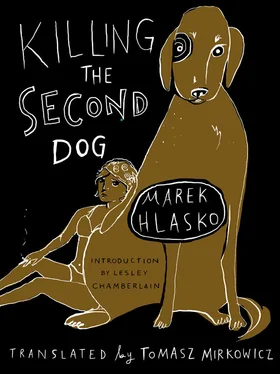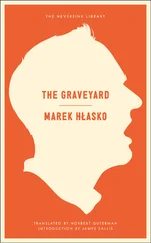In Czestochowa in 1945 he witnessed the arrival of the Red Army to “liberate” the city. Terrible memories from that time come back to haunt the protagonist of Killing the Second Dog . In his autobiography Hlasko remembered the woman who tried to avoid being raped by addressing the commandant in Russian and welcoming him with a shot of vodka. The glass was trampled underfoot. The Russian spoken by soldiers violating a man’s wife came back verbatim: “Don’t worry, we’ll just give her a little poke and then it’s over.” These nightmares merged with bad conscience at what the penniless immigrant without work was forced to do to survive in Israel. There is poignant moral desperation in Hlasko, as readers of Killing the Second Dog will find.
A photograph of Hlasko still in Israel after two years shows him bitter and worn-down at not yet thirty. From Israel where he labored in Tel Aviv, Eilat and Jaffa, he begged the Polish authorities to allow him home. Like the protagonist of The Graveyard , and implicitly like Kafka’s Josef K, Hlasko would have been content to be judged, rather than left to wander in a living hell of absurdity and exclusion.
One feature of his writing is a contempt for religious and ideological convictions acquired, as it were, without thinking. His communist experience made him despise men and women willing to “learn how to think.” The Graveyard studied with a pity rare in Hlasko the downfall of an official on whom the system suddenly turns, when before he had embodied that system. It was a tale which Hlasko knew bore obvious comparison with Arthur Koestler’s far better-known Darkness at Noon .
Not ideology but the simple terrible business of how people live together hovers over the unhappy stories Hlasko tells us. In communist Poland lives were uncomfortable, downtrodden and merciless, a cruelty exacerbated by the biting cold of winter, although occasionally, for moments, the misery was redeemed by the beauty of the mountains. In Israel it was the heat, unbearable for European immigrants, and the maddening dry wind, that enveloped his characters in existential languor. The seaside settings for Killing and All Backs Were Turned have to remind us of Meursault, Camus’s anti-hero in The Outsider , blinded by heat and light just before he shoots dead an innocent man on an Algiers beach. Civilized life struggles to come to terms with Meursault’s motivation, or lack of it. In one of its aspects Killing the Second Dog presents a kind of absurdist tableau to a sympathetic American visitor, to win her sympathy. Perhaps the last possible way to trump the malign world is to take the absurdity of evil to new heights. Over and over situations arise in Hlasko in which characters must undermine and destroy their neighbors, or succumb themselves. Love and lust, indecipherable the one from the other, and the need to survive, drive them on. Alcohol, sleeping pills and amphetamines, and an addiction to brawling, help one day turn into the next.
All the parallels suggested by Sartre’s insightful definition of the post-war novel can be followed up in Hlasko’s case. Like most dissenting writers in the communist era, he was well aware that Kafka had gone before him in capturing the absurdity of the system which gave no answers and provided no entrances and exits to the mystery it seemed to enshrine. It’s possible Hlasko never read Camus, but he must strike us as an existentialist writer out of sheer personal experience of being a radical outsider. In his readiness to fight back on the page against a raw deal from life he also found natural brothers-in-arms in the American writers, though no specific one comes to mind. He gives the impression of having read pulp fiction rather than Faulkner. Moreover, although early critics mentioned Hemingway, that connection seems misleading, for certainly Hlasko’s world is macho, but it is hardly crowned by honor.
The plot of Killing the Second Dog is fraud. Two penniless immigrants defraud wealthy American women visiting post-war Israel. The ruthless Robert is the brains behind the scam, and Jacob, one of Hlasko’s alter egos, is the means. The scheme plays on this other-Hlasko’s good looks and his ability to learn a part. He tells these women what they want to hear. Robert in his previous life produced Shakespeare. Now he scripts scams featuring his hunky friend.
As scene follows scene, Killing the Second Dog , a picaresque tale of how the scheme doesn’t follow the plan, derives its depth from an almost comic unwillingness to concede some genuine human emotions. The pseudo-romantic hero Jacob is at once a puppet, where he should be a human being, and a kind of Macbeth, being urged on by the ruthless Robert to do the deed, which he both does and does not.
In fact all of Hlasko’s themes, bar the Israeli setting, were already evident in his first work. They include a general distrust of women and a tendency to see them as either whores or, occasionally, angels. The sex in Hlasko is mostly prostituted. Sex, in the tainted reality that destroyed a young couple’s happiness in First Step in the Clouds , has become for men and women equally just another means to survival. Male companionship, the redeeming feature of Next Stop Paradise , returns in Killing as a something-better-than-nothing, a joint conniving, a physical dislike, but still better than being alone. Telling his unfortunate tales Hlasko excels at the one-line putdown, the witty repartee. He also memorably evokes natural forces as the backdrop to the human drama. Darkness is one theme in Killing . Under its unfriendly spread, the two conspirators seem to be in a tussle with the universe. The power of the sea to create a narcotic oblivion is another. “No wise-ass bastard can change that, or try to; that’s what felt so good about looking at the sea.”
The dog in Killing the Second Dog is part of the absurd show the fraudsters put on to woo their victim. Hlasko gave some half-convincing answers to curious critics at the time, including that he had once seen a Nazi shoot a dog. But in a more satisfying hermeneutic reading of the text the dog stands in for the unnamed protagonist who sacrifices the best part of himself to pull off a mean trick. Robert and partner buy only purebred, “film star” dogs, whose food costs them far more than what they spend on themselves. “The dog has to be big, happy and full of life. It’s got to be loved and pampered by everybody.” The gorgeous dog, whom other characters quickly love, becomes then one more pawn to manipulate in the game.
Another account of the dog suggests itself. Could it be that Hlasko, who assimilated biblical stories in his childhood, and had his alter ego explain himself as a Catholic in Killing , knew the story of Tobias and the Angel? The only dog mentioned in the entire Bible accompanies the Angel who in turn accompanies Tobias on a long journey to recover his father’s money. A trusted third party is keeping it safe. “Tobias and the Angel,” in which two men set out with a dog, is a story of decency and love from start to finish, the very opposite of the world Marek Hlasko encountered.
Yet another interesting character in Killing is the child, Johnny, a tough guy and a troublemaker suffering from not having a father. In his relationship with the hunky con-man from Poland we can see Hlasko the child meeting Hlasko the man. The submerged moral themes make Killing worth several readings. When the narrative ends with a cry for the possibility of goodness in a man’s life, it is a moment for the reader to reflect on that other great influence on Hlasko’s moral outlook, Dostoevsky.
After leaving Sonia Ziemann — whom uncharitably he called naïve, but of whom he also wrote that he did not want to spoil her life — a second time, Hlasko unsuccessfully tried to kill himself in Munich. Pages of his autobiography, written after he recovered from this suicide attempt, are devoted to a sarcastic account of the interview he has with a German doctor, in which he tries to tell him that the memory of what happened — with the Nazis, with the Red Army — just won’t leave him.
Читать дальше












